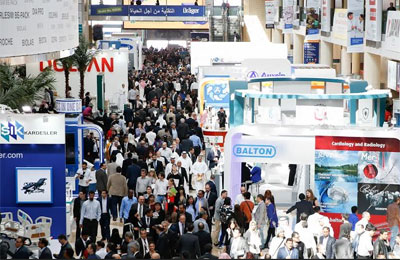
Arab Health... latest innovations in healthcare
Innovation in health delivery systems urged
DUBAI, January 27, 2015
The Middle East must look to more innovative approaches in the healthcare delivery system, which will involve non-traditional means such as technology, telecom and retail companies to effectively serve industry needs, a top official said.
“The expected growth in the healthcare market will not only boost GDP, it can also help the UAE and the oil-rich states to diversify,” added Ryder Smith, Middle East Health Industries Leader, PwC.
He was speaking at the ongoing Arab Health Exhibition & Congress 2015, the largest healthcare event in the Middle East, which is concluding on January 29 at the Dubai International Convention & Exhibition.
Organised by Informa Life Sciences Exhibitions, the event hosts 4,000 international and regional exhibiting companies and more than 120,000 attendees.
“As we look to the future, in order to maintain financially sustainable and accessible healthcare systems, a whole-economy approach is essential,” Smith added.
“By bringing together such a large group of industry experts including healthcare providers, regulators, technology and solution providers, and investors, among others, Arab Health helps facilitate the exchange of information and highlight potential investment opportunities.”
Simon Page, managing director, Informa Life Sciences Exhibition, said: “Arab Health is in ideal platform to support the flow of capital and critical knowledge in the healthcare industry. This year we have seen the introduction of technologies such as Siemens Healthcare’s digital mobile X-ray system and 1.5-tesla MRI scanner with reduced operating costs and the announcement of new programmes, such as the Dubai Health Authority’s roll out of four medical tourism packages.
“The introduction of new technologies to the region and the development of partnerships help strengthen Dubai’s position as a healthcare hub in the Middle East and reflect the opportunities for growth of the industry in the region.”
PwC highlighted that for Governments in the UAE and the region to cope with hyper growth in the healthcare industry, they need to implement alternative delivery models including but not limited to public-private partnerships (PPPs).
“PPPs establish a long term contractual arrangement between public and private entities where the skills and assets of the private sector are utilised by the public sector to deliver services and/or infrastructure to the general public,” Smith said.
“These types of partnerships can help address capacity problems facing health systems across the region including the lack of essential infrastructure, the lack of investment capital, workforce shortages, and the variable quality of the services provided.
“Additionally, through the introduction of competition, well managed PPPs can help improve efficiency while shifting some risk away from governments. While the track record of PPPs in the region is somewhat uneven, both regulators and the private sector are keenly aware of the potential and my expectation is these partnerships will accelerate and deepen,” Smith concluded. – TradeArabia News Service







